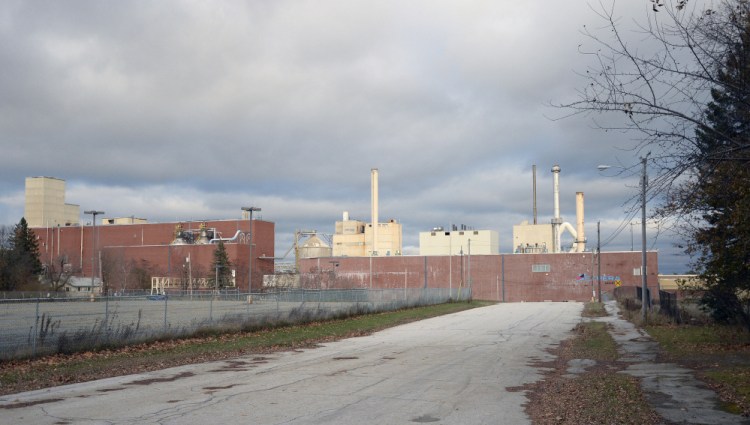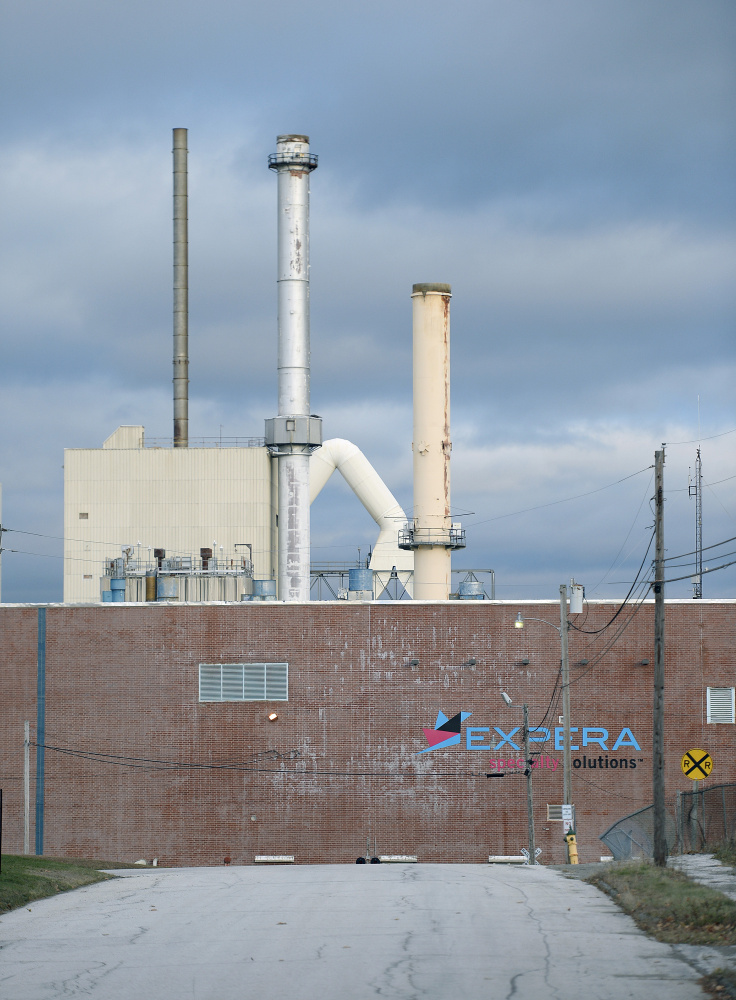The latest attempt to transform a shuttered pulp mill in Old Town into a production center for wood-based energy and fuels is tangled in a lawsuit filed by a prospective buyer, who says he was illegally pushed out of a $10 million deal in favor of a competitor.
The dispute – which also involves the University of Maine, a trio of major Maine timberland owners and ConEdison Solutions, a subsidiary of the New York energy giant – is another setback for efforts to revitalize the state’s forest economy and find new uses for closed paper mills.
At issue is whether MFGR LLC, a Connecticut asset liquidation consortium that bought the 300-acre mill complex last year, breached its contract to sell the facility to Samuel Eakin of Cape Elizabeth, the managing director of Relentless Capital Co. and an allied company, Old Town Utility & Technology Park. Eakin wanted to restart the pulp mill, fire up the biomass plant and provide energy to the nearby university campus.
In court papers filed in Cumberland County Superior Court, Eakin maintains that, after months of progress toward closing on a purchase agreement, MFGR ultimately decided to sell the mill to a higher-paying buyer. Eakin also alleges that sale would violate antitrust laws and restrain trade in the state’s forest products industry.
The university operates the Forest Bioproducts Research Center in a corner of the mill, where it’s working to commercialize fuels, chemicals and materials made from wood waste. That’s why the future of the Old Town mill has taken on a broader significance.
The research center and the mill’s proximity to both the university and working forests make it an important location to redevelop, according to Jake Ward, the university’s vice president for innovation and economic development. But the legal action is just another example of the challenges Maine faces in repurposing sprawling papermaking sites that have shut down, he said.
“These are large, complex facilities that have a bunch of issues and it’s hard to knit the pieces together,” he said.
DISPUTE COULD STRETCH OUT TO MONTHS
Eakin is asking for a preliminary injunction to block the sale.
A meeting of lawyers this month to lay out a schedule for the case indicates the matter could stretch out at least a year, if the dispute were to progress to a jury trial.
Eakin declined to comment about the lawsuit. He called Relentless Capital “a closely held company that engages in complex project financing and corporate restructuring on a confidential basis for its clients.” Eakin’s LinkedIn profile says Relentless Capital engages in “special circumstance” investments, including turnaround companies, generally in the $100 million and below market.
Since the suit was filed in late July, Eakin amended the complaint to include Everett Deschenes and his company Old Town Holdings LLC. Deschenes was director of pulp and fiber at the mill during an earlier attempt to produce biofuels. He was subsequently a partner with Eakin, before the relationship soured.
Deschenes has responded in a filing that Eakin’s claims aren’t based on fact, and has asked the court to dismiss the counts against him.
Deschenes and MFGR also are opposing Eakin’s request for a preliminary injunction.
An Oct. 13 filing by the pair says MFGR did consider a purchase proposal from Eakin, but it fell apart in July 2016, after the city of Old Town declined to purchase a wastewater treatment plant at the mill. It says MFGR was never bound by Eakin’s purchase and sale agreement and never received a deposit. MFGR now is negotiating with another potential buyer, the filing states, an unnamed company in the wood products industry that has made a “significant nonrefundable deposit” for the sale.
William Firestone, who is named in the suit and is president of Capital Recovery Group, part of the MFGR consortium, said last week that it was his company’s policy not to comment on negotiations that are in progress. MFGR also owns the bankrupt Lincoln Paper and Tissue mill, the scene of a large fire last week that destroyed at least one building.
MORE THAN A DECADE OF FAILURES
The Old Town mill has been the site of a string of failures. But it continues to attract entrepreneurs drawn by its potential, which includes 4,000 feet of frontage on the Penobscot River, 400,000 square feet of warehouse space and a 16-megawatt biomass boiler.
The complex had been on a downward spiral since 2003, when Georgia Pacific ceased tissue-making. Three years later, the company closed the pulp mill and associated chip mills in northern Maine, idling more than 500 workers. A succession of ventures aimed at restarting the pulp mill and jump-starting biofuels production followed: Red Shield, Old Town Fuel & Fiber and in 2014, Expera Specialty Solutions. Each went bankrupt or closed, erasing hundreds of jobs.
But Eakin saw a way to make the mill profitable, court papers indicate.
In 2015, he formed Old Town Utility and Technology Park with forestry and engineering firm James W. Sewall Co. of Old Town, through the company’s president and chief executive, David Edson. They later brought on Deschenes as an equal member. Together, they devised a plan to restart the pulp mill, attract biofuels development and sell steam and electricity to the university’s Orono campus, the latter which required winning a public bid for proposals. Revenue from the pulp mill and the power contract would be crucial to any redevelopment.
Through an engineering subcontractor, Relentess partnered in 2016 with ConEd Solutions to respond to the request for proposals. The parties also negotiated an agreement defining their roles, if they won. Sixteen companies responded.
DESIRE FOR CONTROL
Eakin and his team also were refining ideas about how to make the pulp mill profitable. That led to a meeting in June 2016, the complaint says, with a trio of men whose families are among Maine’s largest timberland owners. They were Jeannot Carrier, Tim Varney and Tom Gardner, who together had formed a Lincoln-based business called CVG Inc.
The complaint outlines how the families have collaborated on various projects in the United States and Canada for nearly 20 years and alleges that they saw the Old Town mill as a way to shut out competitors. It quotes from a response, said to be signed by Gardner, for UMaine’s proposal request:
“The opportunity to participate in a truly vertically integrated solution, reaching from our timberlands to the planned biorefinery at Old Town to providing thermal energy and electricity to the University of Maine, is an expression of a new paradigm for our companies. We have access to over 1 million acres of timberland within 100 miles of Old Town, and expect to enter into a long-term contract with ConEdison to provide a guaranteed supply of biomass at a competitive price.”
Gardner didn’t return a phone call seeking comment about the case.
The complaint goes on to say that, with control of the biomass facilities, CVG could potentially supply them at elevated prices and capture a substantial share of the potential savings for the university.
“These realizations helped prompt CVG to seek to acquire the facility in competition with OUT (Old Town Utility) and to oust Relentless for the ConEd Solutions bid,” the complaint alleges.
The complaint further describes a relationship between Deschenes and CVG’s principals, which it alleges led to Deschenes helping CVG advance its interest in buying the mill.
In August 2016, the complaint says, ConEd learned that it was one of the four finalists to supply power to UMaine. It alleges that ConEd then removed Relentless without notice from the bid team and substituted a company formed by CVG. Behind the scenes, it says, ConEd, Edson from J.W. Sewall and Gardner were working together on the mill deal, a breach of their partner agreement with Eakin.
In June 2016, ConEd won the competition to supply energy to the UMaine. According to the complaint, two of the runners-up are appealing the decision.
Ward said he couldn’t comment on the appeals process. But he said the contract was aimed at securing stable energy costs from renewable sources for the campus and until a sale of the mill takes place, that goal is unrealized.
Send questions/comments to the editors.





Success. Please wait for the page to reload. If the page does not reload within 5 seconds, please refresh the page.
Enter your email and password to access comments.
Hi, to comment on stories you must . This profile is in addition to your subscription and website login.
Already have a commenting profile? .
Invalid username/password.
Please check your email to confirm and complete your registration.
Only subscribers are eligible to post comments. Please subscribe or login first for digital access. Here’s why.
Use the form below to reset your password. When you've submitted your account email, we will send an email with a reset code.